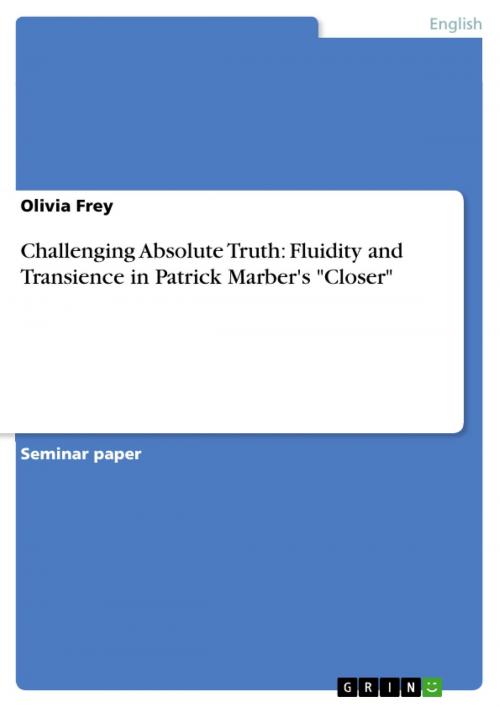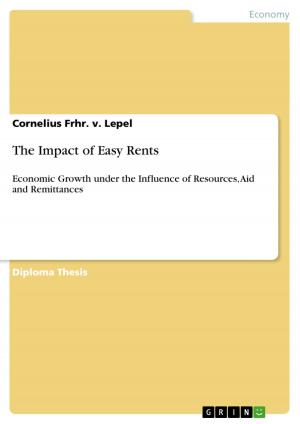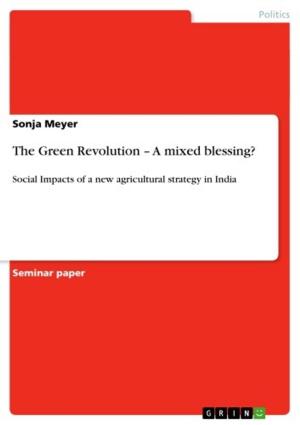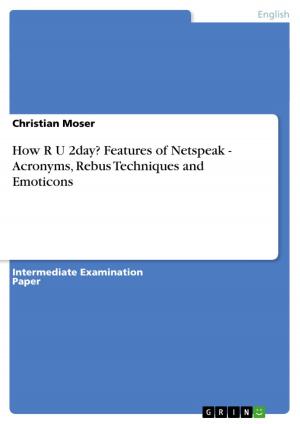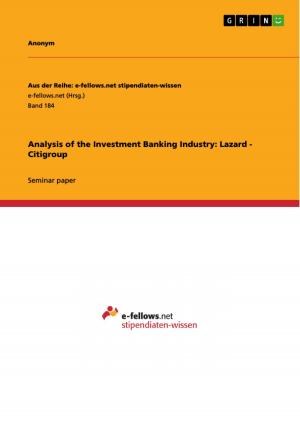Challenging Absolute Truth: Fluidity and Transience in Patrick Marber's 'Closer'
Fiction & Literature, Literary Theory & Criticism, British| Author: | Olivia Frey | ISBN: | 9783640694440 |
| Publisher: | GRIN Publishing | Publication: | September 1, 2010 |
| Imprint: | GRIN Publishing | Language: | English |
| Author: | Olivia Frey |
| ISBN: | 9783640694440 |
| Publisher: | GRIN Publishing |
| Publication: | September 1, 2010 |
| Imprint: | GRIN Publishing |
| Language: | English |
Seminar paper from the year 2010 in the subject English Language and Literature Studies - Literature, grade: 1,0, University of Vienna (Institut für Anglistik und Amerikanistik), course: Literature Seminar, language: English, abstract: 'There are many ways of interpreting this play. Is it on the Anouilhesque theme of how innocence and the rare ability to love never goes unpunished in this world? Is it about how no relationship lasts, and how everyone ends up alone or with somebody else in a worse kind of aloneness? Or is it about the noose of time tightening around everyone's neck, closer and closer? Or is this the Eliotian theme about our not being able to bear very much reality, and that the truth ultimately kills?' (Simon par. 5) A reflection on the title after reading the play immediately conjures up the question 'Closer... to what?' Due to the variety of themes dealt with in Closer the title first seems to be highly ambiguous. It might refer to the characters' desperate longing and unsuccessful quest for love, sincerity as well as physical and emotional intimacy in happy and fulfilling relationships. It could just as well describe their failing attempt at knowing each others' identity fully, while at the same time playing hide-and-seek with their own. Alternatively, the title possibly alludes to their way of seeking the truth about reality and the perception of time, while facing the transience of human existence, with death coming closer each minute. However, on closer examination, the answer to the initial question is to be found in exactly this polysemy, unified by a common thread: the search for ultimate truth about all these issues. According to Marber, '[i]t is the best possible title for the play because the play is always aspiring to get closer to some kind of definite truth about things but knows it can't' (qtd. in Rosenthal xxiii). In view of this statement, a question mark should actually be put after the title. For the individual characters do not succeed in gaining absolute knowledge or experiencing complete truthfulness. Truth in Closer seems to be a temporary and volatile condition, and thus, the red thread running through the play are the motifs of fluidity and transience on different levels: time, location as well as the characters' identities and relationships.
Seminar paper from the year 2010 in the subject English Language and Literature Studies - Literature, grade: 1,0, University of Vienna (Institut für Anglistik und Amerikanistik), course: Literature Seminar, language: English, abstract: 'There are many ways of interpreting this play. Is it on the Anouilhesque theme of how innocence and the rare ability to love never goes unpunished in this world? Is it about how no relationship lasts, and how everyone ends up alone or with somebody else in a worse kind of aloneness? Or is it about the noose of time tightening around everyone's neck, closer and closer? Or is this the Eliotian theme about our not being able to bear very much reality, and that the truth ultimately kills?' (Simon par. 5) A reflection on the title after reading the play immediately conjures up the question 'Closer... to what?' Due to the variety of themes dealt with in Closer the title first seems to be highly ambiguous. It might refer to the characters' desperate longing and unsuccessful quest for love, sincerity as well as physical and emotional intimacy in happy and fulfilling relationships. It could just as well describe their failing attempt at knowing each others' identity fully, while at the same time playing hide-and-seek with their own. Alternatively, the title possibly alludes to their way of seeking the truth about reality and the perception of time, while facing the transience of human existence, with death coming closer each minute. However, on closer examination, the answer to the initial question is to be found in exactly this polysemy, unified by a common thread: the search for ultimate truth about all these issues. According to Marber, '[i]t is the best possible title for the play because the play is always aspiring to get closer to some kind of definite truth about things but knows it can't' (qtd. in Rosenthal xxiii). In view of this statement, a question mark should actually be put after the title. For the individual characters do not succeed in gaining absolute knowledge or experiencing complete truthfulness. Truth in Closer seems to be a temporary and volatile condition, and thus, the red thread running through the play are the motifs of fluidity and transience on different levels: time, location as well as the characters' identities and relationships.
